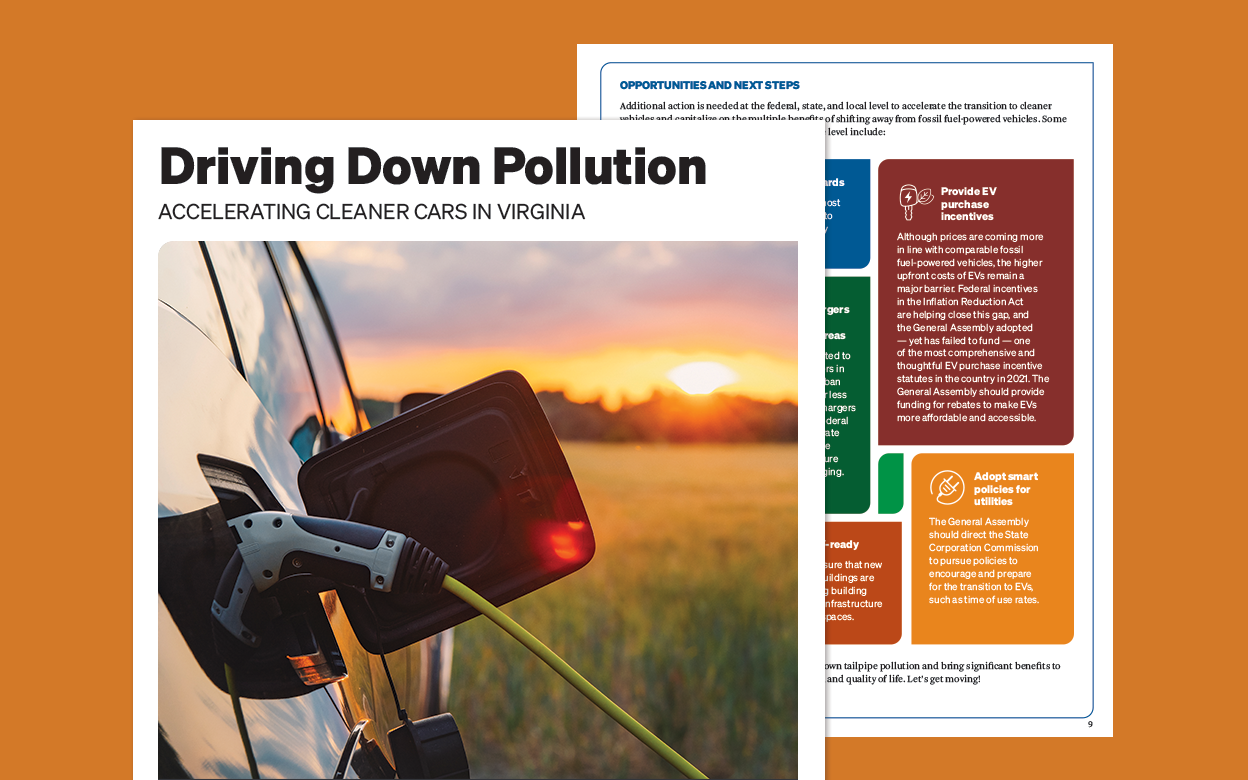Clean energy, transportation top environmental agenda in Virginia
As the 2024 regular legislative session ends in Virginia, SELC and environmental groups across the state were able to hold the line on issues impacting all facets of Virginians’ daily lives while making progress on some key issues.
Transportation wins set stage for the future
Virginia adopted Clean Cars standards in 2021, becoming the first state in the south to adopt one of the most important tools we have to reduce transportation emissions — the leading source of climate pollution. The law became effective in January of this year. There have been efforts to repeal the law —including 6 repeal bills that were defeated in the 2024 session.
Trip Pollard, leader of SELC’s Land and Community program, has been a leader in Richmond fighting for Clean Cars.
“Clean Cars offers tremendous environmental, health, and consumer benefits. Each year we’ve had to fight threats to this important solution for reducing emissions from transportation and each year we have won against misinformation and misunderstanding,” he said.
In a report released during session, SELC provided data on the multiple benefits of Clean Cars and the increase in EV sales in Virginia, and called for policy measures to ensure a smooth and equitable transition to cleaner vehicles.

Driving Down Pollution
Other wins SELC’s transportation team helped secure include $149.5 million in additional funding for the Washington metropolitan area’s transit system — which is critical to reducing pollution and congestion in northern Virginia.
Unfortunately, one area where significant progress was not made was EV charging in rural and underserved areas. Legislation to boost public chargers in areas less likely to receive federal or private sector funding passed both houses, but no funding for charging in these areas was included in the budget.
Clean energy momentum continues
The Virginia Clean Economy Act (VCEA) was passed in 2020, putting Virginia at the forefront of the clean energy transition in the South. Among other things, the law requires Dominion Energy to deliver electricity from 100% renewable sources by 2045 and requires Appalachian Power Company (APCo) to do so by 2050. The law also either removed or modified restrictions that were hindering clean energy developments like rooftop solar from taking off in Virginia.
This session was exciting for many reasons, and I am pleased with what SELC and the coalition have been able to do with solar.
Josephus Allmond, Staff Attorney
With Virginia’s clean energy transition already underway, SELC entered the legislative session hoping to make the transition even more competitive and affordable, while guarding against proposals that could increase carbon pollution or put significant financial risks onto customers
In positive news, lawmakers decided during the session to increase Dominion’s existing shared solar program from 200 megawatts to 350 megawatts and to create a new 50 megawatt shared solar program for Appalachian Power customers.

Bills mandating a standard disclosure form for residential solar transactions and explicitly authorizing residential solar leasing also passed. Standard disclosure forms have been incredibly successful in the states that have adopted them, and solar leasing will provide another option to go solar for low-income Virginians who may not be able to afford the up-front costs of a system.
Josephus Allmond, staff attorney, spent a good amount of time this session helping legislators understand the importance of acting on solar energy and solidifying its place in Virginia’s plans.
“This session was exciting for many reasons, and I am pleased with what SELC and the coalition have been able to do with solar,” Allmond said.
Another issue Allmond followed closely were bills allowing Dominion and APCo to recover project development costs in anticipation of a small modular nuclear (SMR) facility becoming a reality in Virginia.
Ultimately, a bill led by Senator Dave Marsden that does not require Dominion to reimburse customers if it fails to bring an SMR online passed. A similar bill in the House requiring APCo to recover project development costs also passed.
The future of data centers
Data centers will continue to be a hot topic as questions remain about their impact on the power grid, water use and communities. All data center bills were defeated or continued this session and the Joint Legislative Audit and Review Commission will complete a study on their impacts.
Ending on a high note
On the final day of session, lawmakers passed a budget that includes a provision requiring Virginia to rejoin the Regional Greenhouse Gas Initiative (RGGI). Virginia began participating in RGGI in 2021 after the General Assembly passed the Clean Energy and Community Flood Preparedness Act in 2020. The Air Pollution Control Board unlawfully withdrew the state from the program in 2023. The repeal is subject to a pending lawsuit SELC filed on behalf of its client, the Association of Energy Conservation Professionals. The budget is now before the Governor for his action.
“This session was full of new faces from all across the commonwealth, and we appreciated the opportunity to sit down and talk with Delegates and Senators these last two months about SELC’s priority policies,” said Emily Francis, senior policy and outreach manager in SELC’s Virginia office. “We made progress this session and look forward to accelerating environmental policy change in the coming years.”
The General Assembly adjourned March 9, but will reconvene in mid-April for consideration of the Governor’s amendments and vetoes.
